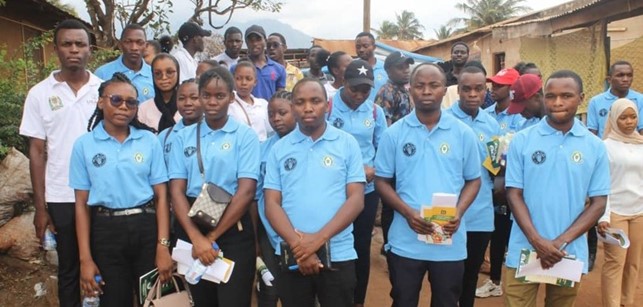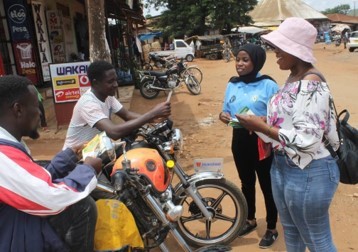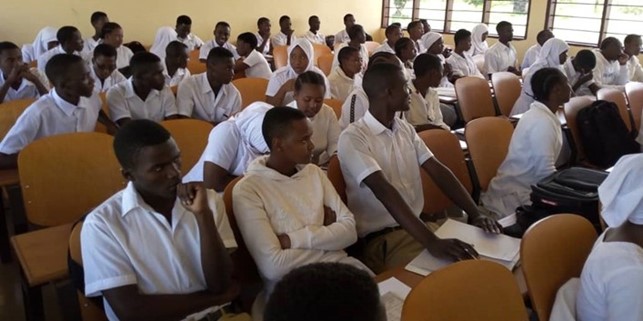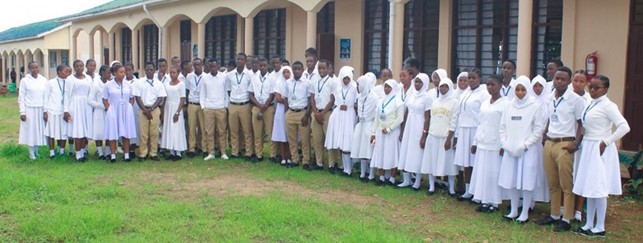ICARS currently supports two projects in Tanzania with the aim of mitigating antimicrobial resistance in poultry farms and in the environment. One of the projects intends to optimise manure composting technologies of poultry manure in Tanzania, leading to safer fertiliser, and ultimately safer food products. The second project aims to reduce antimicrobial use in commercial chicken production through tailored vaccination and biosecurity regimes.
During World Antimicrobial Awareness Week 2022, with support from ICARS, Tanzanian youth from Students One Health Innovations Club (SOHIC) at Hermargs Institute College of Health and Allied Sciences (HICoHAS) organised a student-centred service-learning model, which empowered young people to address antimicrobial resistance while serving their communities.
The initiative was dedicated to empower youth to participate in solving AMR, an urgent global health challenge addressed in the Global Health Security Agenda. The approach aimed to deepen students’ understanding of the importance of the fight against AMR, while building awareness, creating knowledge, and improving good practices in their community.
The following information is summarised from their newsletter on ‘Preventing antimicrobial resistance together’, the thematic slogan for the 2022 World Antimicrobial Awareness Week (WAAW) campaign.

The student campaign reached women and young people working in markets, bus terminals, and business centres. Members of SOHIC created awareness and provided education to the community at Mawenzi and Kingalu market, in Morogoro, on appropriate measures for prevention and control of the emergence of antimicrobial resistance using a One Health approach. The measures included:
- Understanding the roles and responsibilities of policy makers in: developing and implementing the strategic plan (NAP AMR), improving systems for surveillance, monitoring & evaluation; and strengthening measures for prevention and control.
- Understanding and application of stewardship guiding principles that include assurance of access while curbing excess; active involvement of health providers in public and animal health sectors; avoid indiscriminate and irrational use of antimicrobials.
- Strengthen Infection Prevention and Control measures through: Water, Sanitation and Hygiene (WASH); improving immunity through vaccination; optimising the use of laboratory services to ensure right treatment for intended disease, right choice of drugs, right dose and right time for treatment; optimising control of vectors and parasites through application pesticides and biological control methods.

In addition, SOHIC members provided training to young people and children with mental disabilities at Mehayo Center, which works to improve life quality by enhancing practical skills with a focus on pottery, gardening, painting, farming, and sewing. The students translated complex AMR messages into understandable language for teachers and caregivers, who then communicated the messages to residents with disabilities. SOHIC members also provided food, water, sanitary products and cooking oil with imprinted messages of Water Sanitation and Hygiene (WASH) to support Infection, Prevention and Control measures and mitigate the emergence of Antimicrobial Resistance using One Health approach to the Mehayo Center.

Using the student-centred service-learning model, the community benefited from the services and knowledge provided by students, while teachers, instructors, and supervisors deepened their knowledge and changed practices. The initiative proved to be a successful way to empower young people to make a difference in their communities, and to raise awareness about important global issues such as antimicrobial resistance.
As a result of activities implemented by SOHIC at HICoHAS, the WAAW campaign increased AMR awareness and knowledge, regardless of disability status, and increased young person initiated participation in WAAW campaigns.

